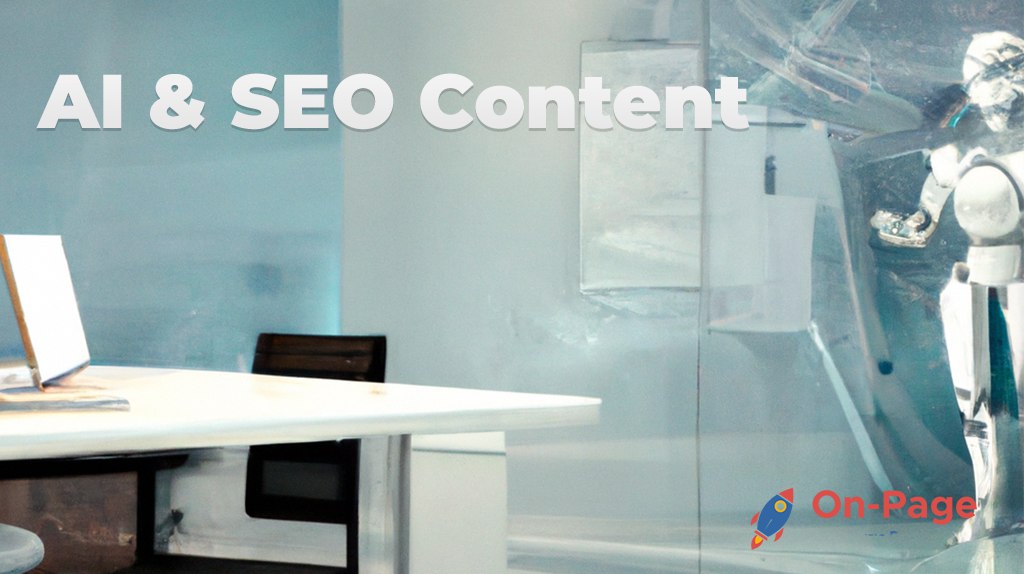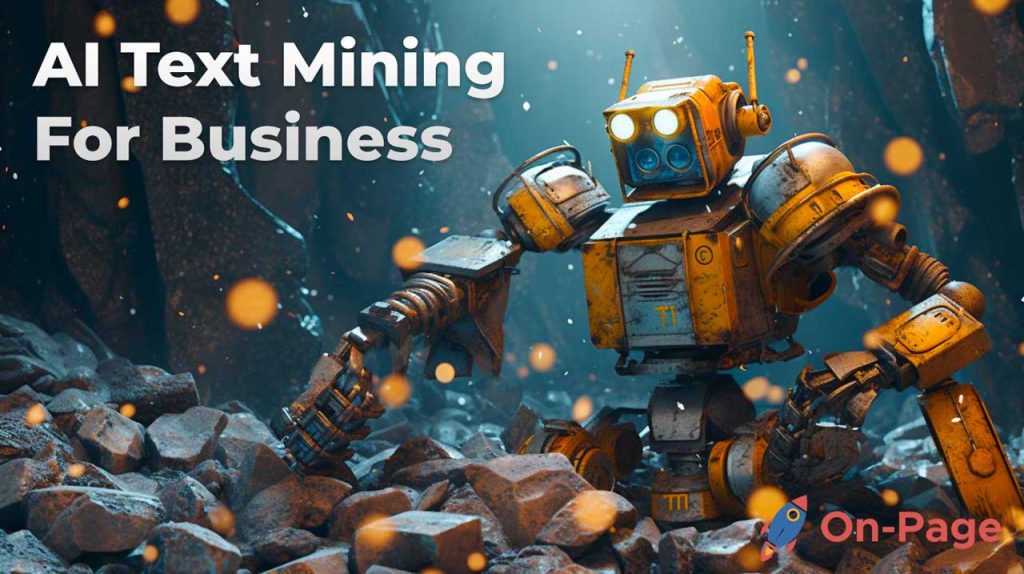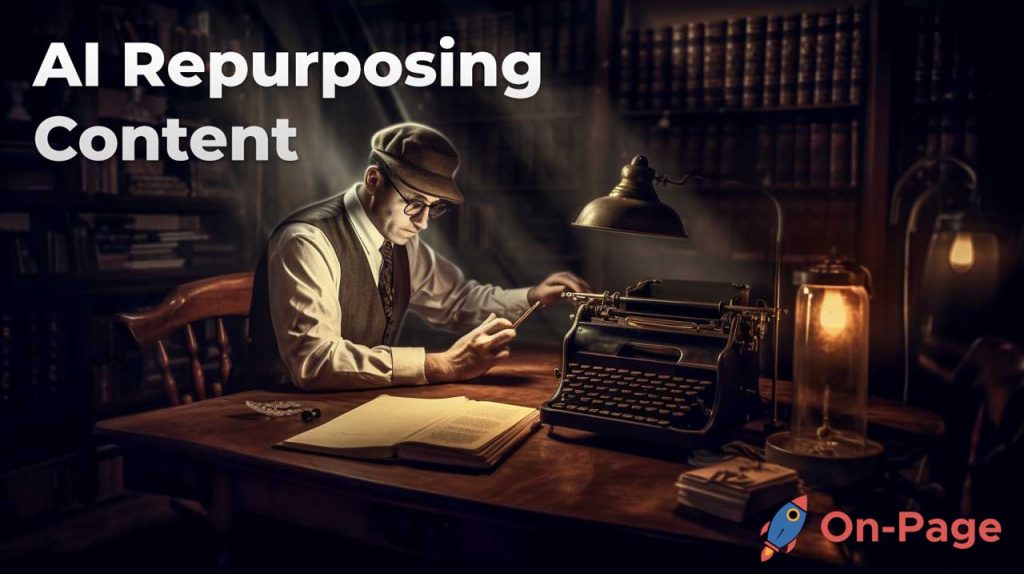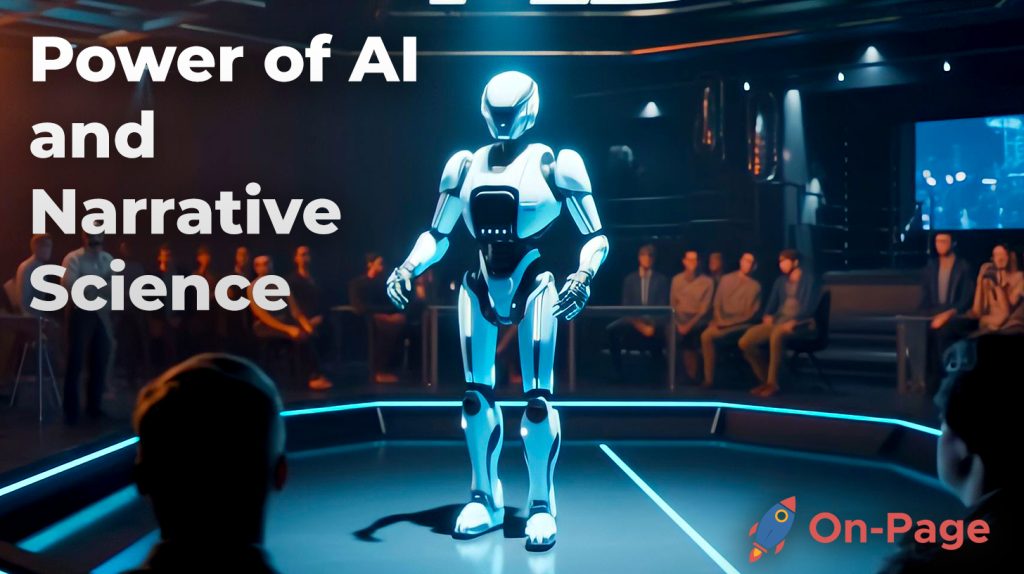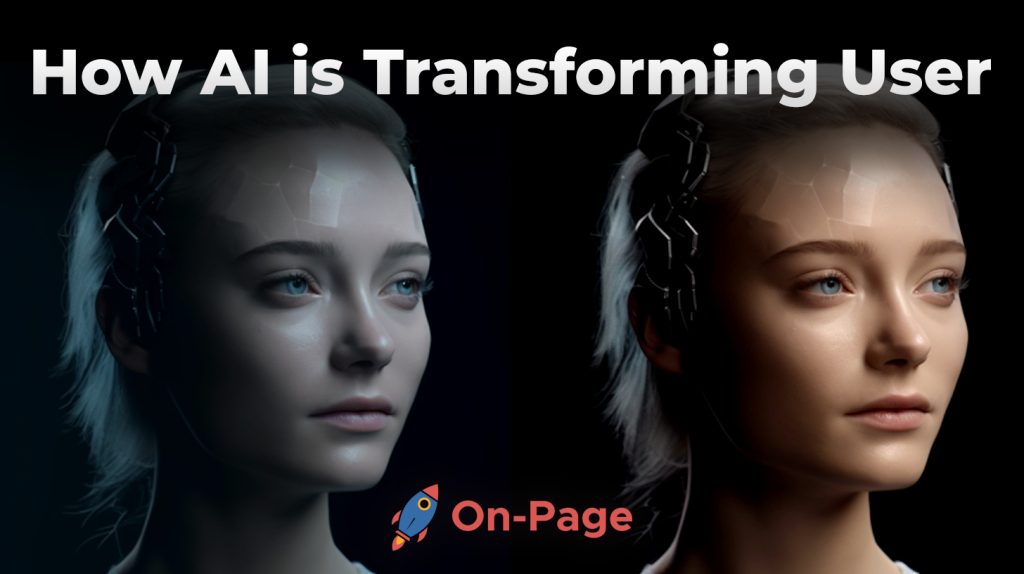Are you ready to unearth a goldmine of AI-driven, keyword-savvy content that skyrockets your business visibility and lures search engine spiders like bees to honey? If you’re nodding in anticipation, then fasten your seatbelts as we unveil the untapped potential of AI and SEO working in tandem to catapult your business into the stratospheric heights of search engine rankings!
AI technology can analyze vast amounts of data and provide insights that can help optimize SEO content for better search engine rankings. This includes tasks like keyword research, identifying user intent, recommending related keywords and phrases, and generating content outlines. By using AI-powered platforms like On-page.ai, businesses can save time and effort while achieving higher quality SEO content with greater accuracy and efficiency.
Understanding AI and SEO Content
In today’s digital world, mastering Search Engine Optimization (SEO) is crucial for any businesses to succeed. As the competition to rank higher in search engine results pages (SERPs) gets more intense by the day, companies are continuously seeking new ways to optimize their content and stay ahead of the curve.
This is where Artificial Intelligence (AI) comes into play. AI is slowly revolutionizing how we understand SEO and has become a vital component in determining the success of any SEO strategy. With AI-powered tools and platforms, businesses can analyze vast amounts of data, get insights into market trends and consumer preferences, create better content, monitor performance, adapt to changing algorithms or trends and so much more.
For instance, let’s consider how AI can help us understand consumer intent which is the ultimate goal to achieving higher organic rankings. Historically, understanding consumer intent involved using keywords that matched potential customer queries. However, with the rise of AI-based technologies like natural language processing (NLP), businesses can now gain a deeper insight into what consumers are searching for. NLP uses machine learning algorithms to understand context beyond mere keyword matching. This means it can identify synonyms related topics/queries as well as provide insights on customer sentiment thereby allowing SEOs to tailor their content strategy accordingly.
Data from recent surveys indicate that over 80% of marketers who adopt AI experience positive changes in their organizations. As search engines move towards using natural language processing (NLP), machine learning algorithms, and deep learning models; it’s becoming increasingly important for businesses to leverage such tools if they want their site ranking well in SERPs.
One argument against leveraging AI-powered SEO tools is that these almost completely automate some aspects of strategic decision-making along with various tasks such as keyword research and selection which would otherwise have been performed manually by experienced SEO professionals. While it’s true that AI-based tools can replace some of the mundane tasks, they could never replace critical thinking and experience involved in developing a comprehensive SEO strategy.
Despite the few limitations and debates surrounding AI-powered SEO and content development tools. The impact of these technologies on search engine rankings cannot be overstated. It’s essential that businesses understand the fundamentals of AI and how to use such tools to unlock their full potential in improving SEO performance.
AI-Powered Tools and Platforms
Investing in AI-powered SEO platforms could be one of the smartest decisions your organization ever makes. As we have already seen, leveraging these technologies can help you gain valuable insights into market trends, analyze vast amounts of data in record time, fine-tune content creation process thereby improving ranking factors.
An excellent example of such a platform is On-Page.ai which is an advanced SEO tool powered by AI that offers various services and features designed specifically to help you improve your website’s ranking on Google, especially when targeting high-value keywords. The platform provides real-time feedback by scanning whole sites just like Google and identifies main content, sidebars, footers, headers, advertisements; thus providing accurate recommendations to help users increase relevance which usually results in better SERP rankings.
One great analogy is to consider how driving cars has evolved over the years, from using horses as the primary mode of transportation through petrol-driven vehicles before witnessing the rise of electric cars and self-driving automobiles today. In the same vein, traditional SEO methods focused entirely on optimizing keywords with little attention paid to user experience. However, with the rise of AI-powered SEO, we have now transitioned from keyword-focused optimization to a more refined approach that focuses on improving user intent and overall user experience.
Overall, as search engine algorithms become more sophisticated and complex, it’s essential for businesses to use AI-powered SEO tools and platforms in their quest to rank higher in SERPs. These tools offer an innovative approach to analyzing data, creating optimized content tailored towards improving customer interface and allowing for enhanced user experience ultimately resulting in better rankings.
- A study by the Content Marketing Institute found that 43% of marketers are using AI-powered technology for their SEO and content marketing strategies.
- According to Gartner, by 2025, approximately 70% of all digital marketing interactions will be facilitated through conversational AI applications for both SEO and content improvements.
- In a survey conducted by Forbes Insights and BrightEdge, 87% of respondents agreed that implementing AI-powered solutions has a significant impact on the overall success of their SEO and content marketing efforts.
- The year is 2023 and investing in AI-powered SEO platforms could be one of the smartest decisions your organization ever makes. Traditional keyword-focused optimization methods are no longer effective, and as search engine algorithms become more complex, businesses need to use AI-powered SEO tools to gain valuable insights into market trends, analyze vast amounts of data quickly, fine-tune content creation processes, and improve ranking factors. On-Page.ai is an excellent example of such a platform, offering real-time feedback by scanning whole sites and providing accurate recommendations to help users increase relevance and achieve better SERP rankings. Businesses using On-Page.ai have reported impressive results with almost no technical expertise required. As the focus shifts from keywords to user intent and overall experience, it’s crucial for businesses to adapt by using AI-powered SEO tools and platforms. These tools offer a refined approach that allows for enhanced user experience ultimately resulting in better rankings.
Finding the Right AI Solution
In today’s digital age, artificial intelligence (AI) has revolutionized the way we approach search engine optimization (SEO) and content marketing. With a smart AI solution, businesses can create high-quality SEO content with minimal human effort and with higher organic traffic. However, choosing the right AI solution can be overwhelming given the plethora of options available today. Therefore, it is essential to invest time in researching reliable and robust platforms that have a track record of results. Let us explore some effective ways to find the right AI solution for your business:
Firstly, start by evaluating your needs and goals for using an AI-powered SEO platform. This will help you make an informed decision about what features and services are essential for your business. For instance, if your goal is to generate long-form content optimized for ranking in Google, choose a platform that supports multiple languages and has a keyword research tool based on user intent.
Secondly, conduct thorough research on various platforms that offer AI-powered SEO tools to enhance your chances of finding the best fit for your business needs. Look for websites such as G2Crowd or Trustpilot that provide authentic reviews from real users.
Thirdly, do not give into flashy marketing tactics or sales pitches without verifying their claims. It is important to have a solid understanding of how their technology works before making an investment.
Think of it like buying a car; you don’t just buy the first car you see without doing proper research on its features, specifications, and reviews from other customers.
Leveraging Data-Driven Insights
Once you have found the right AI solution for your business’s SEO content strategy, it is time to leverage data-driven insights to get the most out of it.
Start by submitting your keywords or topics to your AI platform to get recommended word count, related keywords, potential title tags, semantic analysis summary, and more. AI-powered tools such as FAQ Fox, KeywordsFX, and Answer the Public can help you generate content ideas that are relevant to your business niche.
Reviewing the AI-generated SEO data and reports suggests improvements backed by data that can be shared with your marketing team or content writers. Critically analyzing this data helps ensure that your recommendations will be reviewed for errors, questions, or concerns before setting into motion.
Like a pilot in an airplane’s cockpit, working with data-driven insights helps you get a clear map of where your business is going and what changes need to be made.
Enhancing SEO Content with AI
AI-powered tools and platforms have revolutionized the way we approach SEO and content optimization. Through the use of machine learning algorithms, natural language processing, and predictive analytics, AI can analyze massive amounts of data from various sources to provide insights that can be used to enhance SEO strategies and drive better results.
One of the most significant benefits of AI in SEO is its ability to help identify relevant keywords for your content. With AI-powered keyword research tools, you can get a better idea of what people are searching for and what terms they’re using to find websites like yours. This information can be used to optimize your content by implementing these keywords into your titles, meta descriptions, headers, and body text.
Additionally, AI can also assist in identifying keyword gaps or opportunities. It can analyze your website and other competitor sites to find areas where you may not be ranking well or where you could improve your rankings significantly. This analysis enables you to identify new keyword opportunities to target with your content.
For example, if you run a blog about healthy living and fitness, an AI-powered tool could analyze other top-performing blogs on a similar topic to yours and identify areas where their content is performing well. Say the AI then identifies that many high-ranking articles include phrases related to “meal planning,” while your own site only covers those topics briefly or not at all. This insight could prompt you to produce more content focused primarily on meal-planning within the context of fitness goals.
In addition to keyword research, AI can also help with content optimization by providing content suggestions based on user intent. By analyzing search queries and browsing behavior patterns, AI software can predict what types of content will perform best for a given keyword or topic. As an added benefit, this helps ensure that you’re delivering exactly what users are searching for when they visit your site.
Combining AI-powered keyword research with content optimization has proven effective in boosting traffic and increasing engagement. According to a study by HubSpot, marketers using AI-driven tools and strategies across the sales funnel reported an average 3.1% increase in click-through rates (CTRs) and a 2.4% boost in conversion rates, compared to their counterparts who do not use any AI tools.
Enhancing SEO content with AI also includes improving readability, grammar, spelling, and punctuation. AI-powered writing software can analyze your content in real-time as you write it and provide suggestions for improvements. This analysis ensures that your content is well-written, easy to read, and free of errors or grammatical mistakes that can hurt rankings.
Think of AI writing software as a digital editor that works alongside you to refine your content and make it more engaging. Just like a human editor, AI can help improve sentence structures, suggest synonyms for repetitive words, and identify areas where adjustments can be made for readability.
Content Generation and Optimization
In addition to enhancing existing content with AI technology, you can also use it to generate new content automatically. This is where On-Page.ai’s Stealth Writer comes into play. The Stealth Writer is an advanced tool that uses machine learning algorithms to analyze keywords and generate unique articles relevant to the topic at hand.
With the Stealth Writer on hand, you no longer have to worry about writer’s block or coming up with new topics for your blog regularly. You can input a keyword or phrase related to the topic you want to cover, hit “generate article,” and voila! In seconds, a high-quality article will appear on your screen.
The best part? The Stealth Writer generates articles that pass On-Page.ai’s built-in plagiarism checker while still providing excellent value to readers.
For example, suppose you operate a website focused on time management, and you input the keyword ‘productivity’ into the Stealth Writer. It generates an article discussing various productivity hacks and providing actionable advice to readers. You could publish this article as-is or edit it to your liking while still retaining the core message and information.
However, there is some pushback against AI-generated content, with some critics labeling it as inauthentic or lacking soul. The argument is that only human writers can truly capture the essence of a brand’s story and create engaging content that resonates with the audience on a deeper level.
While there’s some validity to this argument, it’s essential to note that with advances in natural language processing technology, AI-generated content is becoming more sophisticated and personalized every day. As long as businesses are clear about what is generated by AI vs. human writers, they can use AI writing tools strategically without compromising their brand voice.
Monitoring AI-Driven SEO Performance
Monitoring your AI-driven SEO performance is essential to ensuring that your content is meeting your business’ objectives effectively. Knowing what works and what doesn’t helps you adjust your strategies as needed to optimize results. The AI-powered platforms offer a range of performance metrics and insights, allowing businesses to measure their success accurately.
Suppose that after using an AI-based tool for optimization, such as On-Page.ai, one discovers that certain types of pages or content topics are more successful in generating organic traffic than others. In this case, it’s better to focus on these high-performing pages and create similar content styles in the future while avoiding low-performing topics. With On-page.ai’s Stealth Writer, one can generate new ideas with an existing high-performing topic. This way, companies can refine their strategies further by leveraging machine learning algorithms.
Through monitoring performance data related to site speed, user engagement rates, bounce rates, social media shares, click-through rates (CTR), backlinks generated, among other insights offered by AI tools, a company identifies gaps and opportunities for improvement quickly. One can monitor page rankings at specific intervals or track them live within Google analytics under Acquisition -> Search Console -> Queries showing the number of clicks that drive website visitors from search engines like Google.
However, monitoring is only half the equation when it comes to optimizing AI-driven SEO content. Businesses need also to consider staying up-to-date on algorithm changes and trends.
Adapting to Algorithm Changes and Trends
Staying updated with Google’s ever-changing algorithms and keeping pace with emerging trends is vital for maintaining top ranking positions in search engine result pages (SERPs). Frequent algorithm updates mean different measures taken to achieve optimal ranking positions may become obsolete over time. Thus it becomes crucial for businesses relying on AI-SEO strategies to continuously adapt their strategies to current updates.
For instance, Google’s BERT algorithm update, which introduced Natural Language Processing (NLP), has caused a shift in how content is written and optimized. With the rise of voice search, keywords are beginning to diversify away from shorter-form into more extended, conversational phrases that match user queries better. Here On-page.ai offers users readability scores based on Flesch Kincaid Testing. The tool can advise users to make changes in their text, so it is easier to read for their target audience and perfect for the selection of long-tail keywords.
This new content era can be seen as moving from a “keyword stuffing” strategy towards a natural language conversational approach. Suppose one intends to optimize SEO content using AI tools significantly. In that case, keeping an eye on changing algorithms through industry blogs and staying abreast of emerging content trends such as voice search ensures you remain ahead of the competition.
It pays to focus on creating quality AI-driven SEO content effectively that will not only drive traffic quickly but consistently over time. By doing so, businesses remain agile enough in aligning with user intent and up-to-date with Google’s ever-evolving ranking algorithms. On-Page.ai makes it possible for users to optimize for user intent by means of our comprehensive scans identifying strengths and weaknesses in existing pages.
Frequently Asked Questions and Answers
Can AI really replace human SEO writers?
While AI technology has certainly made great strides in recent years, it cannot truly replace the creativity, nuance, and strategic thinking of human SEO writers. While AI may be able to generate content at an impressive rate and make some basic optimizations based on data, it lacks the ability to understand context and the emotional connections that people make with language.
As our reliance on AI continues to grow, we need to keep in mind that the true value of SEO content lies in its ability to engage and connect with human audiences. In fact, a 2019 study found that 60% of marketers believed that producing engaging content was their biggest challenge when it came to SEO strategy (HubSpot).
Furthermore, AI-generated content can often come off as robotic or impersonal if not properly crafted by a skilled SEO writer. This is supported by a 2021 study which found that consumers are more likely to trust and engage with content created by humans rather than machines (The Manifest).
In conclusion, while AI can certainly aid in the optimization and scale of SEO content creation, human writers will continue to play a crucial role in crafting content that resonates with audiences on a deeper level.
What ethical concerns should be considered when using AI for SEO?
As the use of AI in SEO continues to rise, it’s important that we consider the ethical implications of such technology. One major concern is the potential for AI to perpetuate biased and discriminatory content. Bias can be introduced through data sets that are used to train AI algorithms, leading to the propagation of inaccurate or harmful information. This is especially concerning given that search engines are often used as a primary source of information by users.
Another ethical concern is the use of AI-generated content and its impact on plagiarism and originality. It’s important to ensure that AI-generated content is not plagiarized, and that it adds value to the user rather than just recycling existing content.
Moreover, as per a study conducted by Adobe in 2019, 50% of respondents feel uncomfortable with AI analyzing their online behavior for personalized experiences. Hence, companies must ensure they are transparent about their use of AI and obtain proper consent from users before collecting personal data.
In conclusion, while there are benefits to using AI in SEO, companies should exercise caution and consider the ethical implications of such technology. Transparency, accountability, and accuracy must be given higher importance to create a more trustworthy digital world.
How does AI improve the quality of SEO content?
AI undoubtedly enhances the quality of SEO content. Its capability to analyze vast amounts of data and recognize patterns enables it to provide invaluable insights about the target audience, their preferences, and behavior. Moreover, AI-powered tools aid in keyword research, topic generation, on-page optimization, and content creation, resulting in content that is both relevant and valuable to readers.
For instance, a study by HubSpot found that businesses that utilize AI-powered tools for SEO increased their leads by 108 percent and their conversion rate by 120 percent. A separate study also revealed that content optimized using AI algorithms ranks significantly higher than others.
Additionally, AI can assist in creating personalized content tailored explicitly to specific users’ interests and preferences. According to a survey conducted by Evergage, organizations utilizing personalization technologies witnessed a 20% increase in sales.
In short, integrating AI into SEO content strategy can deliver superior results by providing deeper audience insights, enhanced targeting capabilities, and more efficient content creation processes that result in better user engagement and ultimately improve business outcomes. On-Page is currently the best tool to start with.

